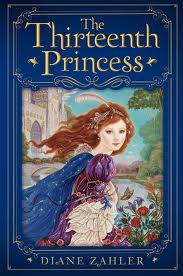 Jocelyn Koehler wrote this review, adapted from her original review which you can read here.
Jocelyn Koehler wrote this review, adapted from her original review which you can read here.
The Thirteenth Princess, by Diane Zahler, is a retelling of the fairy tale “Twelve Dancing Princesses.” It’s narrated through the voice of the thirteenth daughter, 12-year-old Zita. Despised by her father since the queen died in childbirth, Zita is raised as a servant in the palace.
Zita knows that her life isn’t normal. Where else does a princess work in the kitchens? Who else isn’t allowed to talk to her own family? She maintains a secret friendship with her sisters, as well as with the stableboy Breckin. Soon, her once happy sisters get increasingly depressed as they grow into young women with no hope of love. Suitors rarely visit their impoverished kingdom (and worse, the sisters appear unable to speak in the presence of men). Strangely, they also become listless during the day, and their dancing shoes are worn to tatters.
With the help of Breckin and his older brother (the solider Milek), Zita discovers that magic is the root of the problem…even through her father outlawed all magic when his first daughter was born. A conveniently placed good witch in the woods near the castle offers some helpful tips and suggestions for breaking the curse, but leaves the bulk of the work to Zita, Breckin, and Milek. The conclusion is largely happy, somewhat twisty, and spectacularly wet (since it involves a magical and cursed underground lake).
Although inspired by fairy tales, The Thirteenth Princess is really a family drama. This is refreshing, because one doesn’t feel that Zita is magically special or has some in-born ability to defeat evil. She’s very much a normal girl in an abnormal situation. However, the other effect of this choice is that Zita is rather an on-looker through most of the book’s biggest moments. It’s arguable that she is more of a narrator than a heroine.
And if Zita isn’t the heroine, the person who really steps up is none other than Milek, the likable soldier who pines for the eldest Princess Aurelia. Milek’s a good guy, and his heart is clearly in the right place (which is, in fact, pretty much all we learn about his personality). But his presence really makes the story into one where the knight in shining armor rescues the sleeping princess(es). Not a bad story, but perhaps not an ideal message for a book that appears to be aimed squarely at tween girls. (Take one look at the cover and tell me if you think you could pay a boy to read this.)
Ultimately, however, the main lesson of the book is that the right kind of love conquers all. Thus, Zita and her allies break the curse, the bad witch is defeated, the palace is rebuilt, Aurelia and Milek marry, and Zita becomes a legit princess at last. All ends very well.
SPOILER ALERT: Things you might want to know before suggesting this to your kid
Family
It’s a bit messed up. The King is aloof and scary throughout much of the book, and while he is occasionally kind to Zita and her sisters, he’s alarmingly quick to anger, which causes the daughters to fear his decisions and reactions to things. The fact that Zita is raised separately and as a lower class than her sisters is by the King’s command, and she understandably thinks he hates her for being the death of his queen. By the end of the story, the King expresses regret for his poor decisions, but his death soon after means that the sisters never get to know him post-curse.
Secrets
The problems in the story all stem from the secrets characters keep from each other. Some are sensible (don’t tell Dad where an illegal good witch is hiding because he’ll kill her), some are pointless (don’t tell Zita she’s related to the royal family she cooks for for the first 7 years of her life). And of course, the biggest secret is kept by the Big Bad, who lives a lie for over two decades so she can be close to her unrequited love.
Sex
While there’s no actual sex at all, innuendos, references, and implications abound throughout the story, to a degree that I started to find a bit creepy. Suggestive lines fly fast among the minor characters (mostly the palace servants). Zita is aware of maids who have left the palace in disgrace, “with swollen bellies,” and male servants kicked out for causing those situations. Younger readers will probably not even pick up on the majority of the mentions, but it’s there. (For example, it’s implied that Zita’s birth might be the result of a rape; the king literally knocks down the queen’s locked door the night Zita is conceived.) For those who are particularly sensitive to this topic, a pre-reading may be in order.
Recommendation
While The Thirteenth Princess is a perfectly well-written, lively, and good-hearted tale, certain aspects of the story distracted me from enjoying it fully. Those aspects, however, probably won’t bother most readers. Zita is a winsome and often brave character, and if she’s sometimes naïve or overly forgiving…well, those aren’t the worst faults one can have. Aurelia’s and Milek’s romance is sweet, though a bit too simple. But the setting is engaging and the story is easy to get into.
Zahler is a capable storyteller, and has already written two more princess stories after this one, so she’s clearly found her market. It’s a pleasant read for lovers of fairy tales, and will delight girls who are in a princess phase.
The Thirteenth Princess by Diane Zahler
Published in 2010 by Harper
Read free ARC





Speak Your Mind